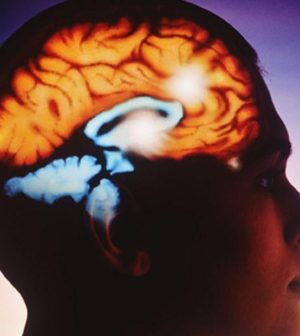- 10 Strategies to Overcome Insomnia
- Could Artificial Sweeteners Be Aging the Brain Faster?
- Techniques for Soothing Your Nervous System
- Does the Water in Your House Smell Funny? Here’s Why
- Can a Daily Dose of Apple Cider Vinegar Actually Aid Weight Loss?
- 6 Health Beverages That Can Actually Spike Your Blood Sugar
- Treatment Options for Social Anxiety Disorder
- Understanding the Connection Between Anxiety and Depression
- How Daily Prunes Can Influence Cholesterol and Inflammation
- When to Take B12 for Better Absorption and Energy
Therapeutic Brain Implant Won’t Alter Personality in Epilepsy Patients: Study

Implanted brain stimulation devices used to treat epilepsy won’t turn patients into someone they don’t recognize, a small study shows.
“We found that the brain implants did not transform patients’ sense of self or personality. Neither the long-term implantation of the electronic device in their brain, nor the electrical stimulation to modulate their brain function, led to changes in their self-perceptions — or the perceptions of the patient by family members and others around them,” said study author Tobias Haeusermann, from the University of California, San Francisco.
“This is reassuring news for more than 3,000 patients with refractory epilepsy implanted with this device to date — as well as the many others who may consider this treatment as a way to prevent their seizures in the future,” Haeusermann added.
Epilepsy causes seizures and affects around 3 million American adults. Around one-third of patients with the condition develop refractory epilepsy – which means that current medications don’t work well, or at all, to stop their seizures. While brain surgery can make a difference, it isn’t suitable for all patients.
Brain stimulation systems first approved in 2013 monitor and decode brain activity, and they automatically adjust treatment delivered through electrical pulses. The devices are approved in the United States to prevent seizures and other symptoms in patients with refractory epilepsy.
In this study, researchers followed 12 patients and their family caregivers over two years to assess their experiences with the devices.
The findings were published Sept. 2 online in the journal AJOB Neuroscience.
“Next-generation brain stimulation devices can modulate brain activity without human intervention, which raises new ethical and policy questions. But while there is a great deal of speculation about the potential consequences of these innovative treatments, very little is currently known about patients’ experiences of any device approved for clinical use,” Haeusermann said in a journal news release.
The researchers noted the brain implant used for these epilepsy patients does not have many of the more advanced functions that are envisioned for future devices.
“This issue is becoming even more pressing, as several similar treatments are currently under development for several common neurological and psychiatric conditions, including depression, anxiety chronic pain, Alzheimer’s disease and ischemic stroke — offering the promise of effective new treatments for these debilitating illnesses,” he added.
More information
The U.S. National Institute of Neurological Disorders and Stroke has more on epilepsy.
SOURCE: AJOB Neuroscience, news release, Sept. 2, 2021
Source: HealthDay
Copyright © 2026 HealthDay. All rights reserved.










